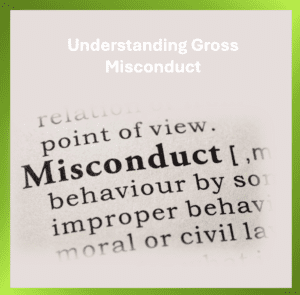Understanding Gross Misconduct: A Guide for Employers
If you’re asking, “What is gross misconduct?” you’re in the right place. In this guide, we will look at what constitutes gross misconduct, explore behaviours that fall under this category, and outline the necessary steps employers should take when managing such situations.

Understanding workplace boundaries – A guide to identifying and managing gross misconduct situations effectively and fairly
Defining Gross Misconduct
Gross misconduct involves serious breaches of conduct within the workplace that can result in immediate dismissal. Examples include:
- Harassment or discrimination
- Fraud or theft
- Physical assault or bullying
- Serious insubordination
- Damage to company property
- Starting a competing business
- Bribery or corruption
- Gross negligence causing harm
- Breach of confidentiality agreements
- Misuse of company assets
- Intentional disreputation of the company
- Inability to work due to substance abuse
- Breach of health & safety regulations
- Serious breach of confidence
- Accessing inappropriate material at work
Distinguishing Misconduct from Gross Misconduct
It’s crucial to differentiate between standard misconduct and gross misconduct. Misconduct refers to inappropriate workplace behaviour warranting disciplinary action, such as warnings or suspensions, but not dismissal. Gross misconduct, however, is a severe violation that can lead to immediate dismissal without notice. Understanding these differences helps ensure fair treatment and appropriate disciplinary actions.
Employer Responsibilities
As an employer, safeguarding your staff’s safety and wellbeing is paramount. This includes understanding gross misconduct, responding appropriately, and following correct procedures.
Failing to do so can negatively affect your workplace and expose you to legal risks.
If you suspect gross misconduct, it’s essential to act swiftly and fairly to investigate and, if necessary, discipline. At Tick HR Solutions, we recognise the complexities these situations present. Our comprehensive HR services include tailored support through gross misconduct procedures, ensuring compliance with employment laws and minimising legal risks.
Managing Gross Misconduct
- Gather Evidence: Collect relevant documents, witness statements, and other evidence objectively and thoroughly.
- Schedule a Hearing: Once evidence is gathered, schedule a hearing. Inform the employee in writing, allowing them time to prepare and the option to bring a representative. Adhering to ACAS Code of Practice guidelines helps prevent legal risks.
- Conduct the Hearing: Allow the employee to respond to allegations in a formal meeting. Present evidence and maintain impartiality to ensure fairness.
- After the hearing, carefully assess the situation. Consider factors such as the severity of behaviour, evidence, employee explanations, past warnings, and fairness compared to similar cases. If dismissal is warranted, provide written notice with details of the misconduct, dismissal terms, reasons, and appeal information.
Avoiding Unfair Dismissal
Improper handling of gross misconduct can lead to unfair dismissal claims, investigated by an employment tribunal. Keeping comprehensive records of the incident, including evidence, hearing notes, and policy details, is vital.
An unfair dismissal ruling can lead to legal, financial, and reputational consequences, making expert HR guidance essential.
Get in Touch with Tick HR Solutions
For expert advice on handling gross misconduct, contact Tick HR Solutions. Our experienced team provides professional, personalised support to help you manage HR processes confidently and effectively.
Whether you need comprehensive HR services or assistance with a specific issue, we’re here to support your business goals.
